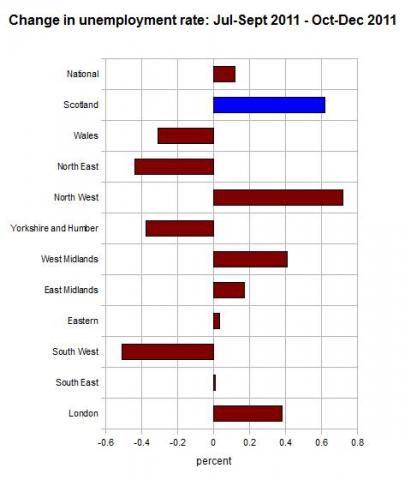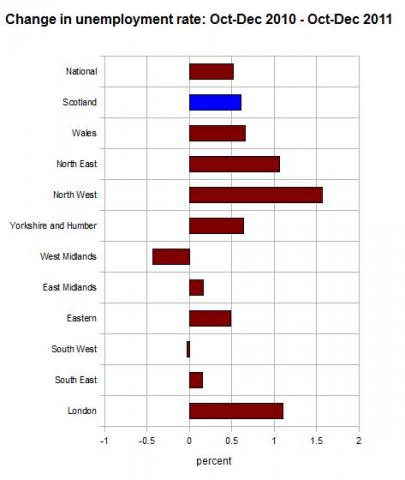Are one in three jobs lost across the UK in Scotland?
"Unemployment rose faster in Scotland than in England over the last year...
"On the most recent figures, one out of every three jobs lost across the whole of the UK was in Scotland."
Ed Miliband, speech to Scottish Labour Party Conference, 2012
With the debate over Scottish independence still looming over Westminister, Labour leader Ed Miliband spoke at the Scottish Labour Party Conference outlining the key economic issues facing Scotland in the context of Conservative and SNP government.
He claimed that, over the last year, unemployment rose faster in Scotland than England and that, on the most recent data, one in three jobs lost across the UK was in Scotland.
So exactly how bleak are the figures for Scotland?
Analysis
Assuming that Mr Miliband was referring to unemployment statistics, the relevant Office for National Statisitcs (ONS) data from last month confirm that, from October to December last year, there were 2.67 million unemployed people in the UK. This was an increase of 48,237 people on the previous quarter.
The ONS also compiles more specific data that allows for analysis on a regional or local level. Examining the regional statistics for Scotland shows that, in the same time period, there were 231,248 unemployed people in Scotland, an increase of 16,435 on the previous quarter.
So the source behind Mr Miliband's claim seems clear: just under 16,500 more unemployed people in Scotland is around one-third of the 48,000 more across the UK as a whole.
But how does Scotland compare to the rest of the UK?
The same figures for ten other regions across the UK (excluding Northern Ireland) demonstrate that, at the end of last year, Scotland saw one of the sharpest quarterly rises in the unemployment rate, second only to the North West of England.

However, taking only one quarterly change presents a limited picture. Examining the annual change in unemployment, from the end of 2010 to the end of 2011, shows that Scotland's rise is comparatively more modest, while the situation is more consistently bad for the North West.

Mr Miliband also states the claim that Scottish unemployment rose faster over the last year than in England.
While the above graph shows that Wales and some regions in England saw steeper rises over the last year, the average across England as a whole is a different story given the falls in the West Midlands and South West.
The average rise in unemployment across England was 0.52 per cent, compared to Scotland's 0.61 per cent rise in the same time period and Wales' 0.66 per cent rise. So Mr Miliband's claim is supported by the figures.
It should be noted however that Mr Miliband's comments are focused on the number of jobs lost rather than the number of people out of work. The measures are subtly different, and the consequences of mixing the two can cause problems, as Full Fact has found before.
While the number of unemployed people has indeed risen in Scotland and the UK as a whole, the number of workforce jobs has actually increased.
The ONS data on workforce jobs for Scotland (sheets 4 and 5 of this spreadsheet) show that, for the most recent quarter, around 11,000 more jobs exist in Scotland. This compares to UK data which shows an increase of 150,000 jobs for the same quarter.
Both figures are estimates and should be treated as such, however they serve as a useful reminder that Mr Miliband's figures strictly concern the number of people out of work rather than the number of jobs lost.
Conclusion
The claims made by Ed Miliband in his speech are accurate, however the wording is imprecise. His claims are correct in so far as the unemployment count in Scotland is concerned, but does not reflect the actual change in job numbers.
In addition, while Scotland has accounted for one in three more unemployed people since the previous quarter, the region's performace for last year as a whole was more moderate.
Scotland's unemployment rate has indeed risen faster than England as a whole over the past year, but is still more modest than London, Wales, and the north of England. The stronger south of England performance raises England's average performance significantly.